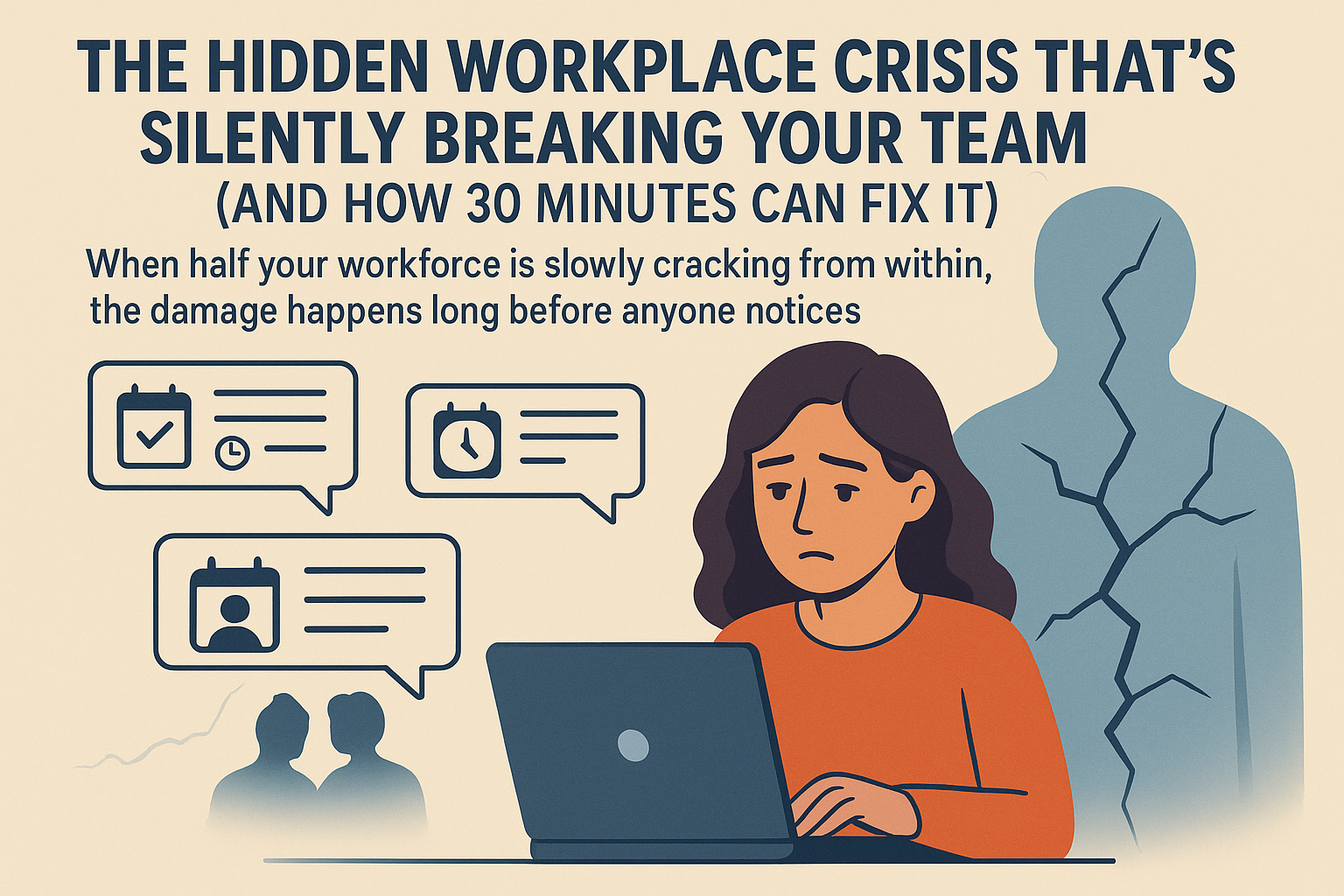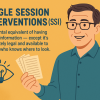Quiet Cracking
The Hidden Workplace Crisis, Qutte Cracking, That's Silently Breaking Your Team (And How 30 Minutes Can Fix It)
When half your workforce is slowly cracking from within, the damage happens long before anyone notices
Sarah stares at her third meeting invite of the morning. Same agenda. Same people. Same feeling of being invisible. She used to volunteer ideas, stay late to perfect projects, even organize team lunches. Now? She does exactly what's required. Nothing more. Her manager thinks she's fine—after all, her work gets done.
But Sarah isn't fine. She's "quiet cracking."
🔹 The Silent Crisis Costing Billions
Research indicates that 54% of American workers are experiencing quiet cracking—a persistent state of workplace unhappiness that slowly erodes motivation, engagement, and eventually, performance. Unlike burnout or quiet quitting, quiet cracking differs from other workplace issues because its symptoms are hard to spot.
Most people experiencing this phenomenon still show up. They still deliver. They just stop caring.
"When trust erodes, people don't know whom to turn to. Even if they share, they fear the data will be used against them." — Amit Sharma, Group CHRO, Gokaldas Exports
The financial impact? Gallup reports that disengaged employees cost the global economy $8.8 trillion annually. That's not a typo—it's nearly 9% of global GDP vanishing into the void of workplace unhappiness.
🔹 Why Your Best People Are Secretly Struggling
Imagine you're underwater, but nobody notices because you're still swimming. That's quiet cracking.
Nearly half (47%) of employees experiencing quiet cracking report having managers who are unresponsive and inattentive to their concerns. Add to this:
The Perfect Storm:
🟦 Invisible contributions: 68% of quiet cracking employees feel less likely to be valued and recognized at work
🟩 Uncertain futures: While 82% of employees feel secure in their current roles, this confidence plummets to 62% when asked about their future with their company
🟨 Skill stagnation: Employees who received no upskilling in the past year are 140% more likely to feel insecure
The truth is, quiet cracking follows a predictable pattern: disconnection → disengagement → departure. But here's what makes it particularly insidious—by the time managers notice, it's often too late.
🔹 The Science of Rapid Mental Shifts
What if you could interrupt this downward spiral in just 30 minutes?
This is where evidence-based mental health strategies come into play. Single-session interventions (SSIs) have been quietly revolutionizing how we approach workplace wellbeing. These aren't your traditional therapy sessions that require weekly commitments and months of progress.
How It Works:
Traditional Approach:
- 8+ sessions minimum
- Weeks on waitlists
- Thousands in costs
- Time away from work
The New Science:
- 30 minutes total
- Immediate access
- Fraction of the cost
- Fits a lunch break
Research from leading universities shows that focused, single-session approaches can teach new thinking patterns that stick. Because here's the secret: Most people don't need months of therapy. They need one powerful shift in perspective.
🔹 Breaking the Crack: What Actually Works
Recognition doesn't need to be expensive or elaborate. But recognition alone won't solve quiet cracking. Employees need three things:
✅ 1. Psychological Safety
Create environments where sharing concerns doesn't feel like career suicide. This means managers who actually close their laptops during one-on-ones.
✅ 2. Skill Confidence
Employees experiencing quiet cracking are 29% less likely to have received training in the past year. Even 15-20 minute learning sessions can rebuild confidence.
✅ 3. Future Clarity
Help employees see a path forward. When people understand their trajectory, that 20% confidence gap starts to close.
🔹 The Uncomfortable Truth Leaders Must Face
"Don't worry" might be magic words in persuasion, but they're useless when your team is silently suffering. The fixation on metrics has become so pervasive that leaders ignore warning signs including rising mental health issues.
Here's what most organizations get wrong: They treat engagement like a quarterly metric instead of a daily practice. They invest in ping-pong tables instead of psychological support. They measure productivity while ignoring humanity.
━━━━━━━━━━━━━━━━━━━━━━━━━━━━
In 30 minutes, you could:
✓ Learn evidence-based techniques to rebuild workplace confidence
✓ Develop new neural pathways for handling workplace stress
✓ Create a personal action plan for re-engagement
Start Your Session → Transform your work experience today Learn More → Discover the science behind rapid change ━━━━━━━━━━━━━━━━━━━━━━━━━━━━
Because the truth is, you don't have to stay stuck in the crack. And your organization doesn't have to lose another brilliant mind to silent disengagement.
The research is clear. The solution exists. The only question is: Will you take 30 minutes to change everything?
Mind Hack Lab provides science-backed single-session interventions designed for busy professionals. No waitlists. No long-term commitments. Just immediate, practical tools for mental wellbeing.







